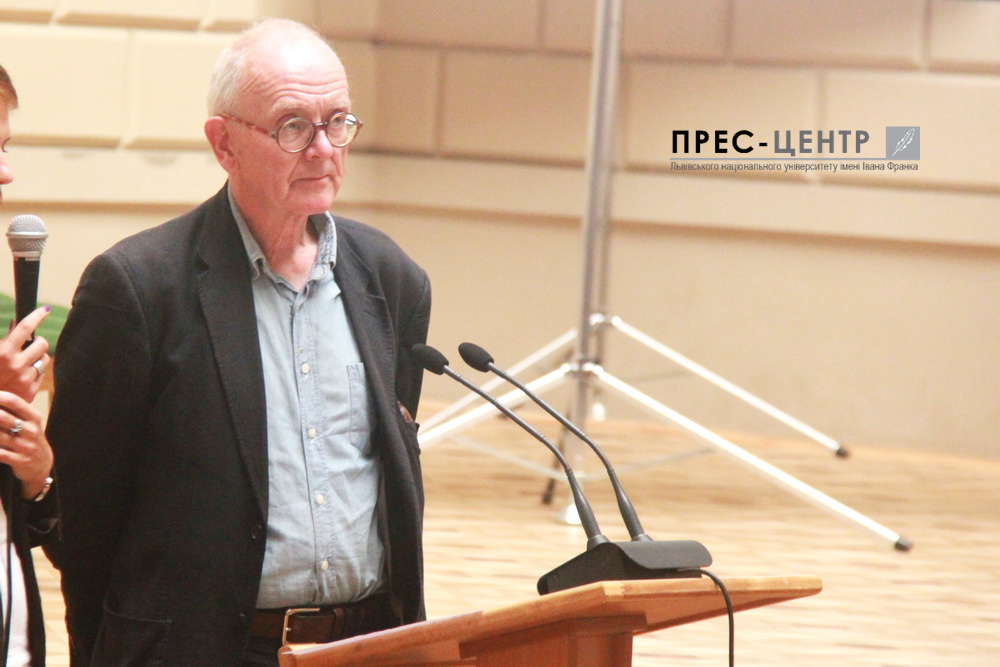
Famous neurosurgeon, Commander of the Order of the British Empire, the writer Henry Marsh delivered a lecture for students of the University. It was about politics, economics, health and medicine, which, according to Mr. Marsh, are closely related. Here is a short excerpt from the interview (which was translated by deputy editor Catherine Mikhalitsyna).
On the experience of parents. “My father, Norman Marsh, was a lawyer and active member of the NGO “Amnesty International”. Together with his colleague, Peter Benenson, they were engaged in liberation of jailed “prisoners of conscience” – people deprived of liberty because of political beliefs. The activity of “Amnesty International” gave its the results: first, the conditions of detention were improved for political prisoners, and then the organization managed to gain amnesty for thousands of them. As a result, “Amnesty International” was awarded the Nobel Peace Prize. My mother was a political refugee who fled Nazi Germany. That is to say, political activity was the norm in my family. Logically, studying at Oxford University, I also studied law, economics. I had the honor of attending lectures by prominent political scientist and historian Archie Brown, who specialized in the study of communism. He wrote a sensational book “The Rise and Fall of Communism”; so I have no illusions about this period of history. Eventually, I didn’t follow my parents and chose the medical profession. Why I devoted my life to neurosurgery? I will tell about this in the second book. “
On freedom. “True freedom is not money and not democracy. This is the rule of law. After all, if there is no rule of law every democracy becomes a farce. Actually, this is what we now obsderve at the example of your eastern neighbor. The experience of my parents and “Amnesty International” revealed that political activists play a very important role in the rule of law”.
On the work in Ukraine. “I have been visiting Ukraine for medical purpose since 1992. Indeed, I performed a lot of operations and delivered many lectures in Sudan, Nepal… But I’m interested in Ukraine not only in terms of work. I see potential of this country. This is a young country with many problems, but also with many perspectives. Before the Revolution of Dignity my colleagues did not understand my fascination. Only when the world TV channels showed heroism of Ukrainians upholding justice and the right to a decent life, did they realise my words. What impresses me most in Ukrainians? Your stubbornness. And this feature is sometimes most annoying (laughs)”.
On surgery. “40 years in the surgery made me convinced that the majority believes that the most difficult thing for a surgeon is strong hand. But the very process of operation is not the most difficult. The hardest is to make decision to risk the operation and tell the patient the truth about his condition”.
On honesty. “It is difficult for doctors to be honest, primarily because it is very difficult for patients to hear the truth. Recently I had a young lady undergoing complex surgery on the brain. Now she is blind. All doctors, but me, gave her hope of returning her eyesight. I have long decided to tell patients the truth no matter how bitter it may be. I said, “You have lost sight forever. I’m sorry”. And she was crying, and her husband was crying too; I was on the verge … but we have not lost confidence in each other and it’s very important”.
On risks. “Let’s be frank: surgeons like to operate. And like each of us, surgeons are positive about the money. Let us imagine that you have a worshipped hammer in the hands and every blow on nail is rewarded. Wonderful, is it not? But the skill of the surgeon is not only in the operation, but in estimating the risks too. If the risk of surgery outweighs the risk of non-interference, a good surgeon refuses surgery”.
On state medicine. “Medical industry is a bottomless pit of budget acquisitions. We have learned to deal with minor ailments, and are now developing all the still more complex mechanisms of fighting incurable diseases. Each year new studies of drugs and technological inventions become more expensive. And it is very important to correctly distribute the funds. For example, in the US spenders on health care are the highest in the world, and still infant mortality is greatest. The question is how and where the money from the budget is spent”.
Про ненадійність авторитету. «Доказова політика і доказова медицина – те, до чого варто прагнути. Я не прихильник ситуацій, коли рішення спирається на авторитет політика чи професора медицини. Мені потрібні докази того, що його діяльність буде правильною. По собі знаю, скільки б досвіду ти не мав за плечима – від помилки не застрахований ніхто. І ніхто не допоможе тобі уникнути помилки краще, аніж поради колег, їхня критика».
On the unreliability of authority. “Evidence-based policy and evidence-based medicine is something that is worth striving for. I do not support situations where the decision is based on the credibility of a politician or a professor of medicine. I need proof that his work will be correct. For myself I know: no matter how much experience you have, no one is immune to mistakes. And no one will help you avoid mistakes better than the advice of colleagues, their criticism”.